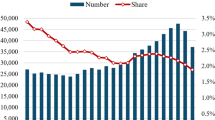Abstract
The study examines aspects of both neo-colonial ties and neo-colonial science in research papers produced by Central African countries. The primary focus is on the extent and pattern of neo-colonial ties and other foreign participation in the co-authorship of Central African research papers. The analysis revealed that 80% of Central Africa’s research papers are produced in collaboration with a partner from outside the region. Moreover, 46% of papers are produced in collaboration with European countries as the only partner, and 35% in collaboration with past colonial rulers. The top collaborating countries are France (32%), the USA (14%), and the UK and Germany (both 12%). Foreign powers also facilitate the production of regionally and continentally co-authored papers in Central Africa, where European countries participate in 77% of regionally co-authored papers.
The practice of neo-colonial science, on the other hand, features in a survey of reprint authors of Cameroonian papers. The survey investigated specific contributions made by Cameroon coauthors to the research processes underlying a paper. Cameroonian researchers contribute intellectually and conceptually to the production of research papers, irrespective of whether the collaboration involves partners from past colonial or non-colonial countries. Their most frequent role in collaborative research with foreign researchers remains the conduct of fieldwork.
Similar content being viewed by others
References
Costello, C., Zumla, A. (2000), Moving to research partnerships in developing countries, British Medical Journal, 321(7264): 827–829.
Dahdouh-Guebas, F., Ahimbisibwe, J., van Moll, R., Koedam, N. (2003), Neo-colonial science by the most industrialised upon the least developed countries in peer-reviewed publishing, Scientometrics, 56(3): 329–343.
Hwang, K. (2008), International collaboration in multilayered center-periphery in the globalization of science and technology, Science, Technology, & Human Values, 33(1): 101–133.
Jentsch, B., Pilley, C. (2003), Research relationships between the South and the North: Cinderella and the ugly sisters? Social Science & Medicine, 57: 1957–1967.
Langer, A., Díaz-Olavarrieta, C., Berdichevsky, K., Villar, J. (2004), Why is research from developing countries underrepresented in international health literature, and what can be done about it? Bulletin of the World Health Organization, 82(10): 802–803.
Lansang, M. A., Dennis, R. (2004), Building capacity in health research in the developing world, Bulletin of the World Health Organization, 82(10): 764–770.
Mouton, J. (2008), Regional Report on Sub-Saharan Africa, A meta-review produced for the Symposium on Comparative Analysis of National Research Systems, 16–18 January 2008, UNESCO, Paris, France.
Nagtegaal, L. W., De Bruin, R. E. (1994), The French connection and other neo-colonial patterns in the global network of science, Research Evaluation, 4(2): 119–127.
NEPAD (2006), Africa’s Science and Technology Consolidated Plan of Action, Office of Science and Technology of the New Partnership for Africa’s Development (NEPAD), Pretoria, South Africa.
Pouris, A., Pouris, A. (2007), The state of science and technology in Africa: A scientometric assessment, Proceeding of ISSI, 619–630.
Schott, T. (1988), International influence in science: Beyond center and periphery, Social Science Research, 17: 219–238.
Schott, T. (1991), The world scientific community: Globality and globalization, Minerva, 29: 440–462.
Schott, T. (1998), Ties between center and periphery in the scientific world-system: Accumulation of rewards, dominance and self-reliance in the center, Journal of World-Systems Research, 4(2): 112–144.
Shrum, W., Shenhav, Y. (1995), Science and technology in less developed countries. In: S. Jasanoff, G. E. Markle, J. C. Petersen, T. Pinch (Eds), Handbook of Science and Technology Studies (revised edition), Sage Publications, Chapter 7, pp. 627–651.
Staniland, M. (1987), Francophone Africa: The enduring French connection, Annals of the American Academy of Political and Social Sciences, 489: 51–62.
Author information
Authors and Affiliations
Corresponding author
Rights and permissions
About this article
Cite this article
Boshoff, N. Neo-colonialism and research collaboration in Central Africa. Scientometrics 81, 413–434 (2009). https://doi.org/10.1007/s11192-008-2211-8
Received:
Published:
Issue Date:
DOI: https://doi.org/10.1007/s11192-008-2211-8




